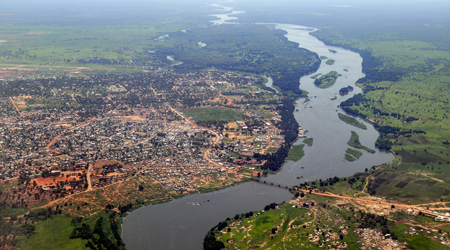A scenario is unfolding in Africa between Egypt, Sudan and Ethiopia on the Grand Ethiopian Renaissance Dam (GERD) project on the Nile River. The project is a gravity dam on the Blue Nile River that has been launched by Ethiopia and under construction since 2011.

As of October 2019, the work stood at approximately 70 per cent completion. Once completed, the reservoir could take anywhere between five years and 15 years to fill with water, depending on hydrologic conditions during the filling period and agreements reached between the three countries.
It has an installed capacity to generate around 6.5 GW of electricity. It is said that, at its maximum capacity of 74 billion cubic metre (BCM), the GERD will store 150 per cent of the average annual flow of the Blue Nile, which is 49BCM. This is a serious concern to other riparian Nations along the flow of the river.
In a bid to find a level playing ground for all three countries in this issue, several meetings were held since 2014, with tempo picking up since late 2019 where Washington offered to facilitate talks between the three countries. At least 12 meetings were held between November 2019 and February 2020, culminating in a draft agreement that Ethiopia declined to sign.
In assessing the issue, the International Crisis Group (ICG), a conflict prevention organisation, observed that Ethiopia is moving ahead with the construction in spite of Egypt’s apprehension of a reduced downstream flow of the Nile, the source of around 90 per cent of its freshwater supply.
The ICG states that the Nile basin countries could be drawn into conflict because the stakes are so high: Ethiopia sees the hydroelectric dam as a defining national development project; Sudan covets the cheap electricity and expanded agricultural production that it promises; and Egypt perceives the possible loss of water as an existential threat.
It also added that Ethiopia settled on a dam design featuring a huge reservoir, bigger, some experts contend, than what was needed for a dam intended to generate hydropower rather than to store water for irrigation.
It, therefore, suggested a two-step approach to find a level playing ground among the countries: first, they should build confidence by agreeing upon terms for filling the dam’s reservoir that do not harm downstream countries.
Next, they should negotiate a new, trans-boundary framework for resource sharing to avert future conflicts. Most urgent is the question of how quickly to fill the dam’s reservoir.
Apart from the ICG, other bodies have been involved in finding solution to the challenges facing these countries and the way forwards. In 2013, an International Panel of Experts (IPoE) was given the mandate to “review the design documents of the GERD, provide transparent information sharing and to solicit understanding of the benefits and costs accrued to the three countries and impacts if any of the GERD on the two downstream countries.”
A treaty, the “2015 Agreement on Declaration of Principles (DoP)”, was even concluded between the three countries to guide this process. These Principles embraced relevant International law principles and guidelines governing trans-boundary international rivers, mainly not causing significant harm to riparian states, fair and appropriate use of Nile Water, ensuring sustainable development, regional cooperation, territorial integrity and building common trust, exchanging relevant information in a timely way and peaceful settlement of disputes.
DoP stipulated that the studies recommended by the IPoE shall be used to agree on the rules governing the filling and operation of the GERD and that the entire process should be completed within 15 months.
These provisions also make it incumbent on Ethiopia not to commence the first filling of the GERD, which Ethiopian officials declare could start next July, without an agreement with downstream riparian states.
While Egypt’s letter to the Security Council, a fortnight ago, raises the stakes further, the possibility of armed conflict stemming from the dam dispute is still “very unlikely. We could expect some sort of diplomatic escalation, more aggressive rhetoric.
But a negotiated resolution to this is obviously the best way out for everyone, and there still seems to be plenty of possibility of that,” William Davison of the ICG said.
Outside partners could help build confidence among parties. The European Investment Bank, which the Ethiopians perceive as less pro-Egyptian than the World Bank, might offer Addis funding for the last phase of dam construction.
Such funding could be conditional on Ethiopia cooperating on sticking points such as the fill rate. The EU and other friendly parties should continue its talks with downstream countries on potential guarantees (including loans) and other instruments to support those countries in years in which drought or other shocks endanger food security.
The U.S. and China, which enjoy close ties to some Nile basin governments, could also encourage parties to resolve their disputes before the GERD is completed.
Egypt and other States could consider rejoining the Nile Basin Initiative after enabling conditions are in place, being an important forum that brings together all riparian countries and a venue available for discussing mutually beneficial resource sharing.
Such talks would consider Egyptian proposals that, currently and in the future, upstream countries carry out major development projects in consultation with downstream nations.
A permanent institutional framework could also help the countries prepare for challenges down the road, including climate change-induced environmental shocks, notably variable rainfall patterns, which could cause greater water stress.
African Union’s 2020 theme of “Silencing the Guns: Creating Conducive Conditions for Africa’s Development” is very instructive in these arising challenges.
The union must give priority to concerns raised by different parties on the GERD project and the development and unity of the continent. The overall historical, economic and engineering impact of the project should form a basis for the way forward in this conflict that has been festering for the last decade.
The United Nations should, likewise, have an input that should significantly see to the attainment of silencing the gun in Africa.
By Ismail Abdulaziz (News Agency of Nigeria)
